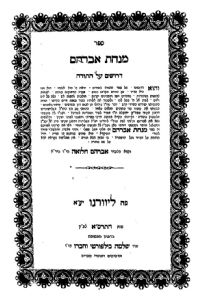A Short Tribute
Hacham Abraham Halua, son of Isaac, was born in Jerusalem in 1921. He began his Torah studies with the sages of Jerusalem, where he also married and had four children; his son was Hacham Shimon Ben Tzion Halua.
In 1887 he set out as a rabbinic emissary for the Sephardi kollel study houses of Jerusalem, the Maghreb Community Committee and the Beit El kabbalist yeshiva, traveling to the Jewish communities of the East, North Africa, Italy and the Balkan. He reached Iraq in 1889 and, in 1896, arrived in Tunis. He remained there for several years as Hacham Yehuda Germon's guest, and edited his book Minhat Abraham, published in Livorno in 1901. In 1908, he reached Damascus.
Hacham Abraham Halua passed away in Marseille, France, on 19 Adar Aleph, 5691 (1921).
A few quotes from the Rabbi on 'Redemption of Israel' in which he teaches to draw the moral from what was created on the eve of the Sabbath to repair yourself for the Redemption
"Ten things were created in the twilight of the Sabbath Eve". The understanding is that these things were all created at the same time, on the eve of the Sabbath, so that we human beings draw a moral concerning the sixth millennium of this last exile, which is called "eve of the Sabbath"… For the end of exile is to remain hidden until the larger part of the sixth millennium has expired, and we still remain in exile; now is the time and moment to draw the moral from these ten things, according to their time and moment… for, to our great sorrow, the greatest human deficiency during this bitter exile has been the saintly thought that the speech and action of people is, for the most part, good but they have no heart, as the verse says: "Because that people has approached (Me) with its mouth And honored Me with its lips, But has kept its heart far from Me, And its worship of Me has been A commandment of men, learned by rote".
Menahem Abraham – Sermons on the Torah, Breishit Reading Portion, p. 1, printed by Shlomo Bilforti and Friends, Livorno, 1901
A few quotes from the Rabbi on 'Redemption of Israel' in which he teaches that the End of Days cannot take place so long as gratuitous hatred remains between us
"Come together that I may tell you what is to befall you in days to come". He (Jacob) meant to reveal the End of Days to them. He used the term "Come together" because the End of Days cannot take place so long as gratuitous hatred between you remains, and you must gather into one union…which is why it is written that "Before his death your father left this instruction". This raises a question. Where do we find this instruction? RASH"I, of blessed memory, may have written what he wrote, but what they intended was to tell him that this was our father's intention, in saying "Come together that I may tell you" that there should be no slander between us and that we should all be united as one and by everlasting love.
Menahem Abraham – Sermons on the Torah, Va'Yehi Reading Portion, p. 27, printed by Shlomo Bilforti and Friends, Livorno, 1901
